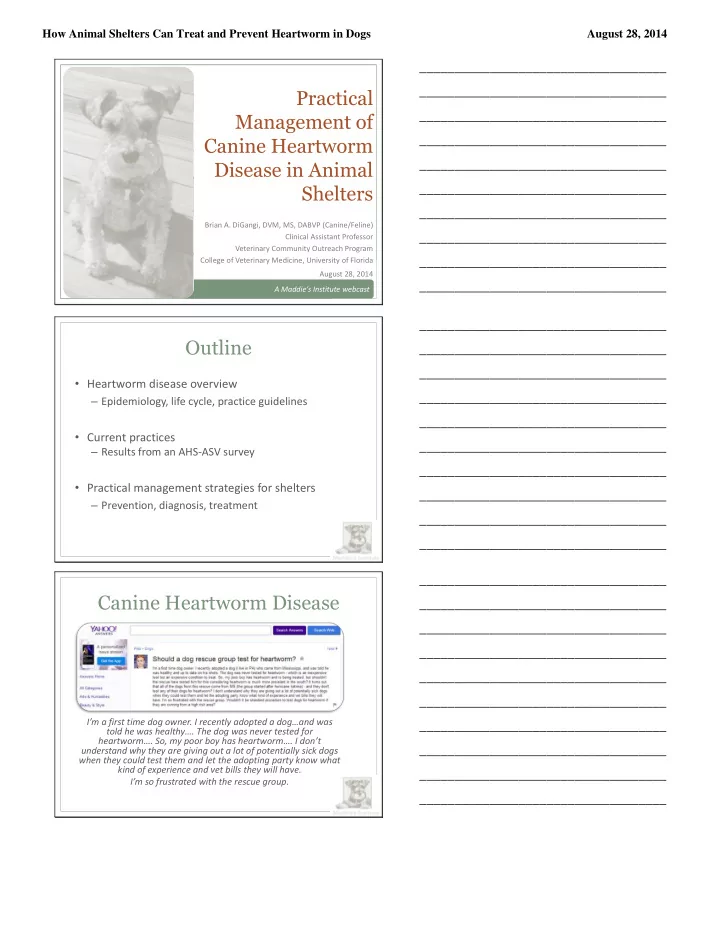

How Animal Shelters Can Treat and Prevent Heartworm in Dogs August 28, 2014 ___________________________________ Practical ___________________________________ Management of ___________________________________ Canine Heartworm ___________________________________ Disease in Animal ___________________________________ Shelters ___________________________________ ___________________________________ Brian A. DiGangi, DVM, MS, DABVP (Canine/Feline) Clinical Assistant Professor ___________________________________ Veterinary Community Outreach Program College of Veterinary Medicine, University of Florida ___________________________________ August 28, 2014 A Maddie’s Institute webcast ___________________________________ ___________________________________ Outline ___________________________________ • Heartworm disease overview ___________________________________ – Epidemiology, life cycle, practice guidelines ___________________________________ ___________________________________ • Current practices – Results from an AHS-ASV survey ___________________________________ ___________________________________ • Practical management strategies for shelters – Prevention, diagnosis, treatment ___________________________________ ___________________________________ ___________________________________ ___________________________________ Canine Heartworm Disease ___________________________________ ___________________________________ ___________________________________ ___________________________________ ___________________________________ I’m a first time dog owner. I recently adopted a dog…and was told he was healthy…. The dog was never tested for ___________________________________ heartworm…. So, my poor boy has heartworm…. I don’t understand why they are giving out a lot of potentially sick dogs ___________________________________ when they could test them and let the adopting party know what kind of experience and vet bills they will have. I’m so frustrated with the rescue group. ___________________________________ ___________________________________
How Animal Shelters Can Treat and Prevent Heartworm in Dogs August 28, 2014 ___________________________________ Learning Outcomes ___________________________________ • Recall characteristics pertinent to clinical ___________________________________ management of canine heartworm disease ___________________________________ ___________________________________ • Understand current practices and challenges to standard guidelines in the shelter setting ___________________________________ ___________________________________ • Design management protocols feasible in the shelter setting in light of their risks and benefits ___________________________________ ___________________________________ ___________________________________ ___________________________________ Canine Heartworm Disease ___________________________________ • Prevalence of positive test results ___________________________________ – Private practice ___________________________________ Region Mean Percent Northeast <1% ___________________________________ Midwest <1% Southeast 4% ___________________________________ West 1% ___________________________________ Overall 1% ___________________________________ – Animal shelters • 15% shelter dogs in Florida ___________________________________ ___________________________________ ___________________________________ Canine Heartworm Disease ___________________________________ • Heartworms are endemic in the U.S. ___________________________________ ___________________________________ ___________________________________ ___________________________________ ___________________________________ ___________________________________ ___________________________________ ___________________________________
How Animal Shelters Can Treat and Prevent Heartworm in Dogs August 28, 2014 ___________________________________ Canine Heartworm Disease ___________________________________ • Heartworms are endemic in the U.S. ___________________________________ – Transport of positive dogs ___________________________________ – Expansion of wild canid territory – Environmental changes ___________________________________ • New water sources • Urban “heat islands” ___________________________________ ___________________________________ ___________________________________ ___________________________________ ___________________________________ ___________________________________ Canine Heartworm Disease ___________________________________ • Other factors ___________________________________ – Some mosquito species survive over winter ___________________________________ – Live and breed for 1-5 months ___________________________________ ___________________________________ ___________________________________ ___________________________________ ___________________________________ Risk of transmission is always present! ___________________________________ ___________________________________ Canine Heartworm Disease ___________________________________ ___________________________________ ___________________________________ L3 L3 L2 L2 ___________________________________ ___________________________________ ___________________________________ ___________________________________ Microfi rofilari laria ___________________________________ ___________________________________
How Animal Shelters Can Treat and Prevent Heartworm in Dogs August 28, 2014 ___________________________________ Canine Heartworm Disease ___________________________________ ___________________________________ L4 L4 2 to 3 months ___________________________________ ___________________________________ Immatur mature 3 to 4 months Adul ult ___________________________________ Matur ure ___________________________________ Adul ult ___________________________________ ___________________________________ ___________________________________ ___________________________________ Canine Heartworm Disease ___________________________________ ___________________________________ Who? Where? When? L1 L2 L3 Mosquito 10-14 days ___________________________________ L3 3-12 days Soft tissue L4 2-3 months ___________________________________ Immature adult 3-4 months Heart & lungs Mature adult 3-7 years ___________________________________ ___________________________________ • Remember… • We can only test for microfilaria & mature adults ___________________________________ • Treatment options & protocols vary by life stage ___________________________________ ___________________________________ ___________________________________ Canine Heartworm Disease ___________________________________ • Prevention ___________________________________ • Diagnosis ___________________________________ • Treatment ___________________________________ ___________________________________ ___________________________________ ___________________________________ ___________________________________ ___________________________________
How Animal Shelters Can Treat and Prevent Heartworm in Dogs August 28, 2014 ___________________________________ Canine Heartworm Disease ___________________________________ • Prevention ___________________________________ – Monthly oral or topical preventive OR ___________________________________ – Bi-annual injectable preventive • Diagnosis ___________________________________ – Annual antigen testing • Testing prior to changing preventives ___________________________________ • Following lapse in preventive ___________________________________ • Tandem mf testing – X-rays, echocardiography as indicated ___________________________________ ___________________________________ ___________________________________ ___________________________________ Canine Heartworm Disease ___________________________________ • Treatment ___________________________________ – Days 0-59 ___________________________________ • Exercise restriction • 4-week course of steroids if symptomatic ___________________________________ • Monthly preventive • 4-week course of doxycycline ___________________________________ – Days 60-91 • Adulticidal treatment with melarsomine (Days 60, 90, 91) ___________________________________ • 4-week course of steroids • Limit activity to cage rest & leash walks ___________________________________ ___________________________________ – Continued exercise restriction for 6-8 weeks ___________________________________ ___________________________________ Current Practices & Challenges ___________________________________ • AHS-ASV working group ___________________________________ – Identify current practices and needs of shelter veterinarians ___________________________________ – Create practical guidelines and resources ___________________________________ • February 2014 – Online survey administered to ASV membership ___________________________________ – 105 responses ___________________________________ ___________________________________ ___________________________________ ___________________________________
Recommend
More recommend